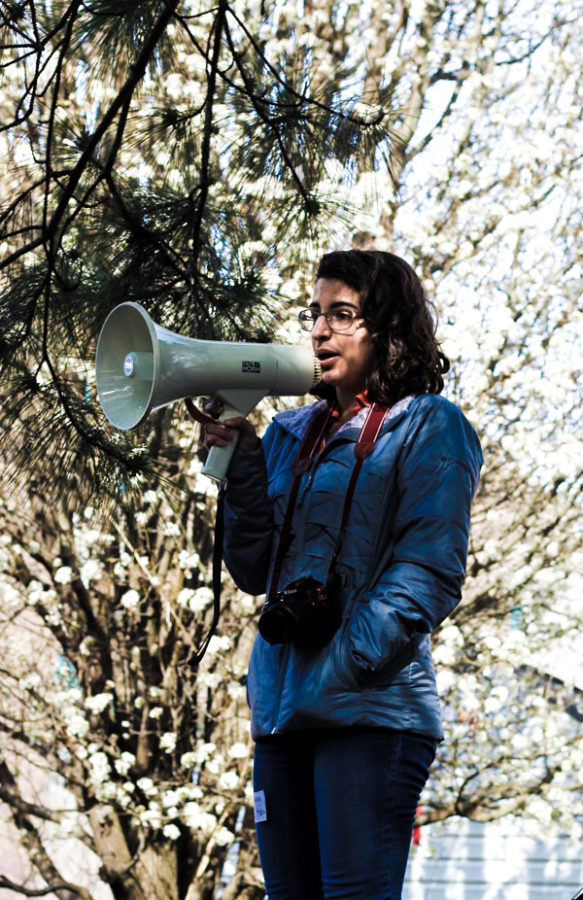Sabrina Hurtado
The Organizers
Throughout the country, many students took it upon themselves to organize local walkouts at their schools in order to coincide with the National School Walkout. Sabrina Hurtado is a junior at Wakefield and one of the organizers of Wakefield’s walkout. Gabriella Kluch is a junior who also helped organize the walkout by aiding Hurtado in encouraging participation in the walkout.
“When I heard about the shooting in [Parkland, Florida], it really affected me because I am from Florida originally and moved here this summer,” Hurtado said. “I heard about the National School Walkout and immediately went to Mr. Bazell to organize everything and make it safe for the students and then it was all [up] to [the students]. I spread the word, I made an Instagram account, I had people pass out little slips but it was due to their participation that the walkout was such a success.”
Wakefield Middle School also hosted a protest that would coincide with the high schools, and Kluch wanted to ensure that the middle school’s voices were heard along with the high school’s.
“I did want to support younger voices to speak out because that’s what this whole walkout was about. Younger people using their voices to actually speak up for what they believe in,” Kluch said. “I feel like there’s a very negative stigma among older people about younger people, about Gen Z and [the] Millenials. [The stigma is] about how we aren’t knowledgeable or educated in what we’re talking about, that we don’t know what we’re talking about, even though it’s our lives that have to pay the price.”
Kluch realizes the importance of the younger voices in politics and believes that educating the younger generations is the key to aiding them in finding their own individual voice.
“I think the biggest thing [to help middle schoolers find their voices] is that we can educate them about [many] injustices this country has had a history of participating in. For example, slavery or the Japanese Internment camps,” Kluch said. “I think it’s important to show younger kids [these things], don’t shield them from this kind of stuff. Obviously, we don’t need to make it horribly graphic, but we have to teach them or else they’re never going to know. History repeats itself sometimes.”
Hurtado emphasizes her belief that despite many of the participants of the walkout being below voting age, they can still have a voice in the school safety debate and honor the victims of Parkland.
“I think it’s important to realize that you do have a voice in this and that you do have the power to truly change things,” Hurtado said. “Just because we’re in high school and may be minors, it doesn’t mean we don’t have a voice. It’s good to get your word out, to express what you think and what you feel is right.”
Kluch agrees with Hurtado and believes societal change starts with the younger generations.
“Students and young people are literally the ones who seem to shape society,” Kluch said. “As generations go by, you see that there is a lot of progressivism among young people. But I think that it’s a great thing for young people to know that they can use their voices. I think that’s what this walkout was about.”
One of the solutions that the Trump administration has offered to the outraged population is to arm teachers in order to decrease the threat of a school shooting. Kluch believes that arming teachers is not only dangerous, but also creates a burden on the teachers.
“I feel like [arming teachers] makes teaching so much harder to get into,” Kluch said. “Not only are teachers totally underpaid, especially in North Carolina, [but it also] adds that you might kill someone someday. If you’re someone who wants to teach a bunch of preschoolers, is that something you really want to have to worry about? I think school is supposed to be a safe place. What bothers me is [that] the government has presented the argument that they’ll be locked up. Teachers lock up phones all the time, and people still [get to] them.”
Hurtado agrees with Kluch on the fact that arming teachers is dangerous, and also elaborates on how lawmakers should create a safer learning environment.
“I do not believe arming teachers is the best or even the more effective way to decrease the staggering number of deaths due to school shootings,” Hurtado said. “To conquer this issue one has to identify what the problem is, [but] there are many problems to solve within this social crisis [and] arming teachers is said to solve the problem of security in our schools. This approach says a lot about where our values are placed. First, it shows that we put too much value on our guns; so much so that we decide to solve a safety problem by adding more guns to the equation. This method is called fighting fire with fire and has, in numerous cases, shown to result in a complete disaster. Second, it shows how we are trying to create an approach to stop the shooter when [they have] already entered the school, instead of preventing the shooter from even entering the school. In other words, arming teachers it is a solution only if the problem arises.”
Hurtado continues to elaborate on the solutions that she thinks will create a balance between school safety and decreasing the burden on teachers.
“There are so many other great solutions to this problem, including but not limited too, having more security systems in schools and investing in bulletproof glass or simply restricting the ‘bad people’ from having a gun because they obviously aren’t mentally responsible enough like ‘the good people’ are; however, ‘good people with guns’ do not stop ‘bad people with guns’, it only makes for more bullets in the war zone, sorry I meant school zone.”
The National School Walkout transcended American borders to countries overseas, all begging for change and honoring the victims of Parkland. The Walkout forced lawmakers to become aware of the voices of the younger generations.
“I think this was more of an international impact,” Kluch said. “It was not just walkouts in the US. It was walkouts in Australia, in London, even some places in the Middle East. The way I would see this as an outsider is a bunch of kids are literally pleading to their government: ‘please keep our schools safe, because you see what happens when schools aren’t safe’.”
Hurtado believes that uniting as a group is the most powerful thing that students can do in order to invoke change.
“In society, walkouts and protests are often used to bring people together and for others to realize that they’re not the only ones who have these thoughts,” Hurtado said. “It’s a group of people that are all with you, and once you see the magnitude that supports you, you realize that you can make a change. Representatives hopefully will look at this movement, with so many people for the cause, and realize that they have to change something.”

